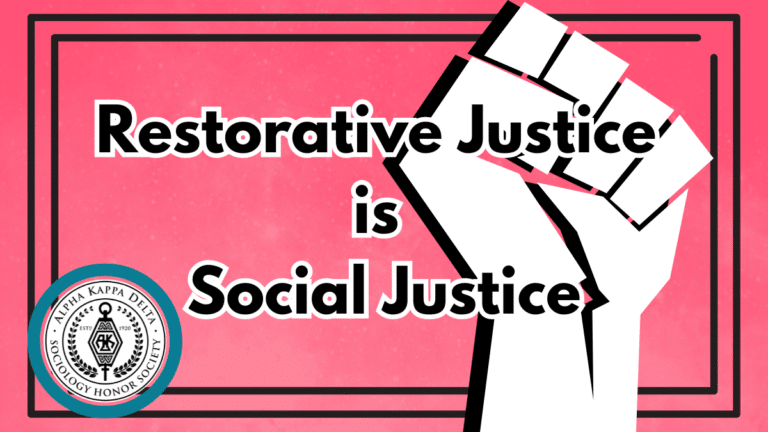
Editorial Note:
This blog feature was compiled by Alpha Kappa Delta’s (AKD) Media Editor, Stephanie Wilson, in celebration of one of the 2023 AKD Social Justice Award recipients, the University of North Alabama AKD Chapter.
Each year, since 2020, AKD has awarded up to three chapters with $1,500 to use toward a social justice initiative on their campus or in their community. In 2023, the AKD Chapter at the University of North Alabama–represented by Dr. Andrea Hunt, Professor of Sociology—received the award to fund their participation in a restorative justice initiative.
Continue reading to learn more about how the chapter utilized their award!
Restorative Justice is Social Justice
Our Social Justice Award stemmed from wanting to enable chapters to identify and implement meaningful change as called for in AKD’s Statement on Racism in America. In 2020-2021, we implemented the Anti-Racism Award Initiative. Chapters were eligible to submit proposals that would stimulate thoughtful discussions of racism and to pursue actions to improve the human condition while addressing some aspect of AKD’s anti-racism statement through this award program.
Following the initial conception of the award, AKD decided to keep this award line; however, we have renamed it to the Social Justice Award and chapters may submit for any theme they deem appropriate. In the case of the University of North Alabama’s chapter, they submitted for an initiative focused on restorative justice.
To learn more about their chapter’s experience with and utilization of the award, our Media Editor, Dr. Stephanie Wilson, reached out for an interview with their chapter representative, Dr. Andrea Hunt.
Can you tell me a bit about why your chapter chose to apply for the Social Justice Award in 2023?
I learned about the funding opportunity at the Mid-South Sociological Association annual conference and was encouraged to apply from other faculty who were familiar with this grant.
How did your chapter utilize the award funds?
The chapter used the funds to educate students about restorative justice and to introduce them to opportunities to further explore restorative justice on campus and in the community. Specifically, the funds were used for an exhibit in the university library on restorative justice in partnership with the Mitchell-West Center for Social Inclusion; a multi-department event on campus with Alabama Appleseed where students learned about the ways restorative justice is connected to community organizing and legislative advocacy; an information session regarding academic opportunities for restorative justice; and a campus outreach event with the Alabama Restorative Justice Center where they shared about their organization, current projects (restorative justice toolkit), and ways for students to get involved.
How did the initiative your chapter carried out implement meaningful change related to social justice?
The main goal of each of these events was to increase awareness of restorative justice and the local opportunities for involvement in restorative justice. We engaged with students about their familiarity with restorative justice and we provided this feedback to our partnering academic programs and discussed some ways to market these opportunities to the broader campus community. We also collected feedback from all collaborating partners who provided suggestions for additional ways to assist in promoting their programs.
What other groups or organizations did your chapter partner with on the initiative supported by the award funding?
We partnered with the Department of Social Work; Department of Psychology and Sociology; Department of Politics, Justice, Law and Philosophy; and Department of English. We also partnered with Alabama Appleseed and Alabama Restorative Justice Center. The grant helped facilitate multi-disciplinary work across campus and in the community.
What was your chapter’s experience with compiling the application for the AKD Social Justice Award?
The application process was clear and easy to navigate.
What advice would you offer other chapters preparing to apply for the 2024 cycle of the AKD Social Justice Award?
I would encourage other chapters to apply. This grant allowed for us to do meaningful and impactful work on our campus and in the community.